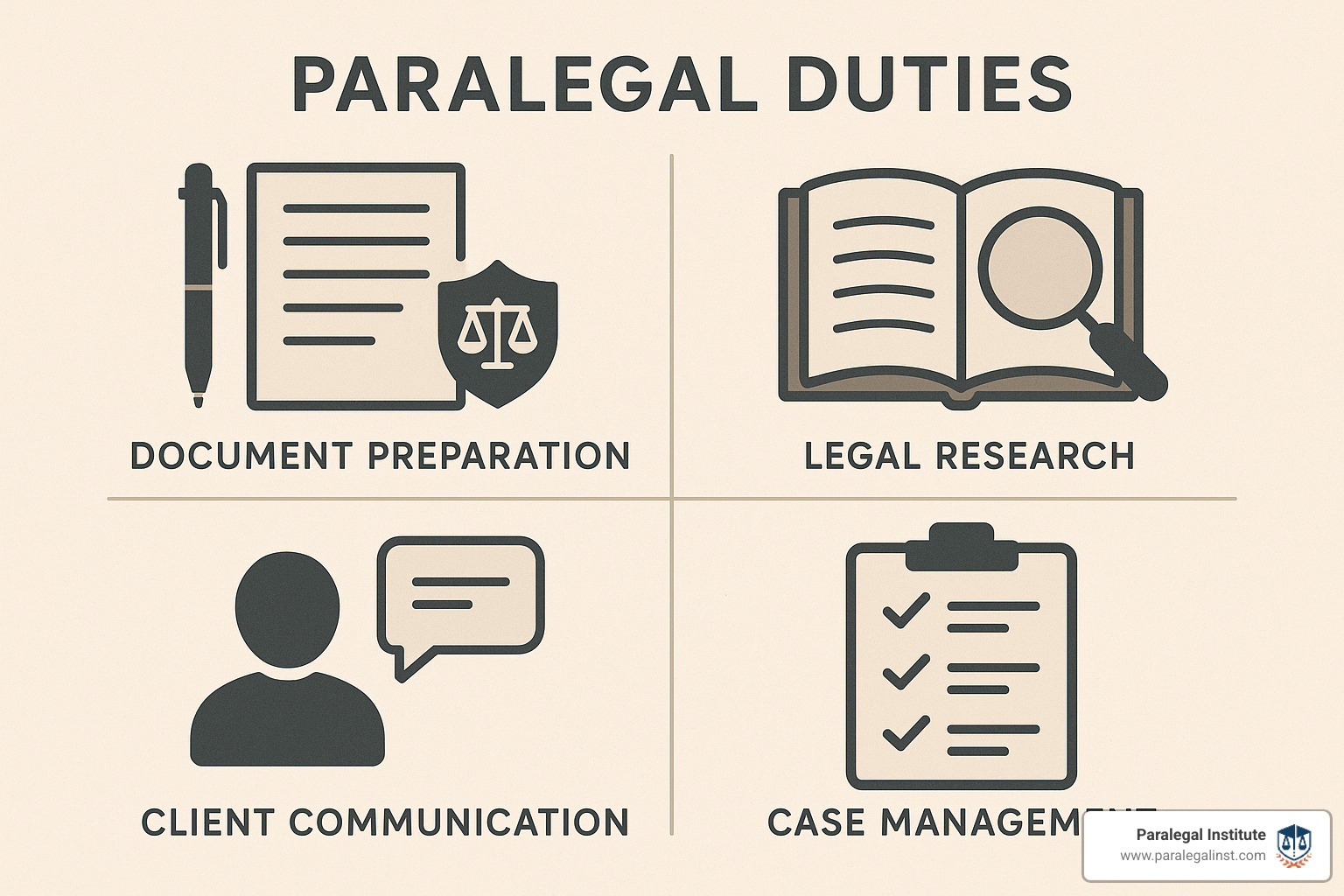From Filing to Fact-Checking – The Life of an Entry Level Paralegal
The Path to a Rewarding Legal Career: Understanding Entry-Level Paralegal Roles
An entry level paralegal job description typically includes administrative tasks, basic legal research, document preparation, and client communication under attorney supervision. While specific duties vary by practice area, most entry-level paralegals can expect to perform the following core functions:
Core Entry-Level Paralegal Responsibilities:
- Document management- Filing, organizing, and retrieving case files
- Basic legal research- Using platforms like Westlaw to find relevant statutes and cases
- Draft simple legal documents- Preparing correspondence, basic pleadings, and forms
- Calendar management- Tracking deadlines and scheduling appointments
- Client communication- Taking messages and providing basic case updates
- Administrative support- Answering phones, scanning documents, and managing mail
The entry level paralegal job description represents your gateway into the legal profession without requiring a law degree. This role serves as the foundation of the legal support team, providing essential assistance to attorneys while learning the practical aspects of law. Most firms require at least a paralegal certificate for entry-level positions, with starting salaries typically ranging between $39,710 and $61,010 depending on location, firm size, and practice area.
My name is Matthew Pfau, and as a law firm owner who has hired and trained numerous paralegals, I've developed a deep understanding of what makes for an effective entry level paralegal job description and the skills needed to succeed in this role. My experience hiring and training paralegals inspired me to develop the Paralegal Institute curriculum to help aspiring legal professionals enter the field with practical, job-ready skills.

Understanding the Entry Level Paralegal Job Description
Stepping into an entry level paralegal job description means starting on an exciting journey into the legal world without the three-year commitment of law school. These roles are designed for newcomers who've recently completed their education and are eager to apply their freshly-minted knowledge in a professional setting. According to the Bureau of Labor Statistics , paralegals "assist lawyers by investigating facts, preparing legal documents, or researching legal precedent" – but what does this really mean when you're just starting out?
What makes the entry level paralegal job description special is that it serves as your foundation in legal support. Law firms and legal departments understand you're still learning, but they expect you to arrive with enough baseline knowledge to contribute meaningfully from day one. Think of it as having your training wheels on – you're still riding the bike, just with a bit more support!
"Entry-level paralegals bring fresh perspectives and enthusiasm that energize our legal teams," shared one hiring manager I recently spoke with. "While they may have less responsibility than senior staff, they're absolutely essential to our workflow." In fact, these junior roles often form the backbone of efficient legal operations, keeping the daily case management wheels turning smoothly.
Most new paralegals find themselves working in law firms, which employ roughly 67% of all paralegals nationwide. These entry positions are intentionally designed to give you broad exposure to different legal processes while you support more experienced team members. This foundation proves invaluable whether you ultimately aim to become a senior paralegal or pursue further education in the legal field.
Entry Level Paralegal Job Description vs Experienced Paralegal
The journey from rookie to veteran paralegal involves significant growth in three key areas:
Responsibility Scale- When you're new, you'll typically handle routine tasks like filing court documents, conducting basic legal research, and creating preliminary drafts of simple documents. Your experienced colleagues, meanwhile, juggle complex cases independently, craft sophisticated legal documents, and might even supervise junior staff like yourself.
Autonomy- Fresh paralegals work under watchful attorney supervision, with each assignment carefully reviewed. As you gain experience and trust, this oversight gradually relaxes. Seasoned paralegals often manage entire aspects of cases with minimal supervision, making independent decisions within their scope of authority.
Mentoring- As a newcomer, you're on the receiving end of guidance and training. Your day might involve organizing findy documents, conducting preliminary research, and drafting basic correspondence. Meanwhile, your experienced colleague could be preparing attorneys for depositions, analyzing complex legal issues, and contributing to case strategy discussions.
Key Differences in Titles: Entry Level Paralegal, Legal Assistant, Legal Secretary
The legal support landscape can be confusing with its overlapping job titles. Understanding these distinctions will help you steer your job search more effectively:
Entry-Level Paralegal: You'll perform substantive legal work under attorney supervision. This role requires specialized education – typically a paralegal certificate – and focuses on case-related tasks like legal research, document drafting, and trial preparation.
Legal Assistant: This title sometimes blurs with "paralegal" but often includes more administrative responsibilities. Legal assistants frequently support multiple attorneys and handle both legal and administrative tasks. Educational requirements vary by employer, making this sometimes a more accessible entry point.
Legal Secretary: This role centers primarily on administrative functions like correspondence, scheduling, and file management. The focus is on office support rather than substantive legal work, though knowledge of legal terminology and procedures remains essential.
Many successful paralegals actually begin their careers in administrative positions and advance as they gain experience and education. As one veteran paralegal told me, "I started as a legal secretary answering phones, but my curiosity about the cases led me to take a paralegal certificate program. That combination of administrative know-how and legal training made me incredibly valuable to my firm."
The beauty of these interconnected roles is that experience in any of them helps you build transferable skills that strengthen your overall legal support capabilities. The entry level paralegal job description may be your starting point, but understanding the entire ecosystem helps you chart your career path more strategically.
Core Duties and a Day-to-Day Workflow
The daily life of an entry-level paralegal is diverse, dynamic, and never boring. While each day brings new challenges, most follow a rhythm that includes document management, research, client communication, and attorney support. Let's walk through what your typical day might look like if you pursue this rewarding career path:

Morning: From Filing to Calendar Management
Your day typically begins with getting organized and ensuring everything is in order. Between 8:30 and 10:00 AM, you'll likely be reviewing your attorney's calendar, checking court dockets for updates, and processing incoming communications. This morning routine sets the tone for a productive day.
Email triage becomes second nature for entry-level paralegals, as you'll learn to prioritize urgent client matters and attorney requests. Filing—both digital and physical—might not be glamorous, but it's the foundation of good case management. Your ability to create logical, accessible filing systems will make you invaluable to your legal team.
Docketing—tracking court deadlines and filing dates—is another critical morning task. Missing a filing deadline can have serious consequences for a case, so entry level paralegal job descriptions almost always emphasize strong organizational skills and attention to detail.
Afternoon: Fact-Checking & Research Sprints
After lunch, your focus often shifts to more substantive legal work. Between 1:00 and 3:30 PM, you might dive into legal research using platforms like Westlaw, hunting for statutes or cases that support your attorney's arguments.
Research is where your paralegal training really shines. You'll learn to steer complex legal databases, identify relevant precedents, and properly cite legal authorities. The Paralegal Institute curriculum emphasizes these practical research skills that allow you to find information efficiently rather than getting lost in the legal weeds.
"The ability to conduct targeted, efficient legal research separates truly valuable paralegals from those who just fill a seat," notes one senior attorney who regularly hires our graduates. "When my paralegal brings me precisely what I need without wasting time on irrelevant materials, it makes all the difference in case preparation."
Cite checking—verifying that all legal citations are accurate and properly formatted—is another afternoon task that requires careful attention. You might also spend time sorting through findy documents, identifying key evidence, and organizing case files for upcoming proceedings. For helpful guidance on perfecting these skills, check out the Legal Research Guide for Paralegals.
Late Day: Trial Prep & Team Collaboration
As the day winds down, the focus often shifts to teamwork and preparation for upcoming events. Between 5:00 and 6:30 PM, you might find yourself organizing exhibits for trial, coordinating with witnesses about their testimony, or preparing presentation materials for court.
Team meetings typically happen in the late afternoon, giving everyone a chance to sync up before heading home. As an entry-level paralegal, you'll often be responsible for taking detailed notes during these meetings and distributing action items afterward.
"I always tell new paralegals that the last hour of the day is often the most important," says a litigation manager who mentors Paralegal Institute students. "This is when we regroup as a team, identify priorities for tomorrow, and make sure nothing urgent is left hanging."
Creating exhibit lists, assembling trial notebooks, and organizing witness files are common end-of-day tasks when preparing for hearings or trials. These activities require meticulous attention to detail and the ability to anticipate what attorneys will need in the courtroom.
Meeting minutes might sound mundane, but they're crucial for tracking case strategy and ensuring everyone stays on the same page. Your ability to capture key discussion points and next steps will be highly valued by your legal team.
The entry level paralegal job description may vary slightly depending on the practice area and firm size, but these core duties form the backbone of the role. At the Paralegal Institute, we prepare you for all these responsibilities through hands-on training that mirrors the actual work you'll do on the job.
Required Education, Paralegal Certificate & Essential Skills
The path to becoming an entry-level paralegal typically requires formal education beyond high school. While requirements vary by employer, most entry-level positions require at minimum a paralegal certificate from a reputable program.

At the Paralegal Institute, our 15-week paralegal certificate program is designed specifically to prepare students for immediate entry into the workforce. I've seen countless students transform from nervous beginners to confident legal professionals through our hands-on approach. Our curriculum focuses on practical skills that employers actually value in entry-level paralegals – not just theory, but real-world legal research, document preparation, and case management techniques you'll use from day one on the job.
Most law firms and legal departments look for entry-level paralegals to hold at least a two-year degree or equivalent education. But here's what's interesting – the trend is shifting toward specialized paralegal education rather than general academic degrees. Why? Employers want job-ready candidates who can hit the ground running with practical legal skills.
When you look at an entry level paralegal job description, you'll typically see a blend of educational requirements and essential skills. On the education front, you'll need a paralegal certificate from a recognized program, strong writing abilities, and a solid understanding of legal terminology and procedures. Knowledge of specific practice areas is also becoming increasingly important – whether that's family law, corporate law, or personal injury.
Beyond the certificate, employers are looking for people with genuine attention to detail (missing a filing deadline can have serious consequences!), exceptional organizational abilities, and a basic understanding of legal research methods. You'll also need to be comfortable with office technology and legal software, which we'll dive into shortly.
Our Hands-On Legal Training at the Paralegal Institute emphasizes these practical skills through simulated case exercises that mirror what you'll face in the real world. Students often tell me these exercises were the most valuable part of their education – the moment when theoretical knowledge transforms into practical ability.
Top Technical Tools for Entry Level Paralegals
Technology proficiency isn't just nice to have – it's essential in today's legal environment. The days of dusty law libraries and paper filing systems are largely behind us. Modern paralegals need to be comfortable with various software applications that support legal work.
Microsoft Office Suite forms the backbone of your technical toolkit – particularly Word for document preparation, Excel for organizing data, and Outlook for managing email and calendars. You'll be formatting legal documents with precise specifications, so understanding Word's advanced features is invaluable.
Adobe Acrobat Pro has become indispensable for creating, editing, and managing PDF documents. Many courts now require electronic filing, making PDF manipulation skills essential for any paralegal.
Legal research platforms like Westlaw and LexisNexis will become your best friends. Knowing how to construct efficient searches and identify relevant authorities can save hours of time and significantly improve the quality of your work.
Case management software (like Clio or MyCase) helps track deadlines, manage client information, and organize case details. Many firms also use specialized time and billing software to track billable hours – a critical skill for paralegals in private practice.
Interestingly, AI writing assistants are becoming standard tools for improving written communication. The ability to leverage these tools while maintaining critical thinking about their outputs is becoming an essential skill for modern paralegals.
Soft Skills That Make You Stand Out
While technical knowledge gets you in the door, it's often the soft skills that determine your long-term success as a paralegal. These interpersonal and self-management abilities help you steer the complex dynamics of legal environments.
Communication skills are absolutely fundamental. You'll need to write clearly and concisely, speak professionally with clients and colleagues, and explain complex legal concepts in terms non-lawyers can understand. As one attorney told me, "I can teach legal procedures, but I can't teach someone to communicate effectively. That's why I value it so highly in my paralegals."
Organization isn't just a nice quality – it's essential when you're managing multiple cases with different deadlines, requirements, and priorities. The best paralegals I know have developed systems to keep track of every detail while maintaining the big picture.
Discretion is non-negotiable in legal work. Client confidentiality is sacrosanct, and entry-level paralegals must understand and respect attorney-client privilege from day one. One careless comment could compromise a case or violate ethical obligations.
Critical thinking separates exceptional paralegals from average ones. The ability to analyze information, identify relevant facts, and apply legal principles is what makes a paralegal truly valuable to their team.
Adaptability matters because legal environments can change in an instant. A new case comes in, a court deadline gets moved up, or an urgent client matter emerges – successful paralegals pivot quickly between tasks and remain calm under pressure.
Teamwork is essential because legal work is collaborative by nature. You'll work closely with attorneys, other paralegals, and administrative staff. Understanding how to support the team while managing your own responsibilities is a delicate balance.
"Technical skills get you in the door, but soft skills get you promoted," a legal staffing specialist recently told our students. "I've seen many paralegals with perfect credentials struggle because they couldn't communicate effectively or manage their time well."
At the Paralegal Institute, we weave soft skill development throughout our curriculum because we know these qualities are just as important as technical knowledge. Through group projects, mock client interviews, and time management exercises, our students develop the full range of abilities needed for success in the entry level paralegal job description and beyond.
Where Entry-Level Paralegals Work & What They Earn
The legal world offers diverse landscapes for entry-level paralegals to plant their professional roots. Whether you're drawn to the fast pace of litigation or prefer the structured environment of corporate law, understanding where paralegals work helps you chart your career course with confidence.

Law firms remain the heartbeat of paralegal employment, hosting about 67% of all paralegals nationwide. These range from intimate boutique practices where you might be the only paralegal (wearing many hats!) to sprawling international firms with dedicated paralegal departments. At smaller firms, you'll likely touch multiple practice areas, giving you broad exposure that builds versatile skills. Larger firms typically assign entry-level paralegals to specific departments—like litigation, real estate, or family law—where you'll develop specialized expertise.
Corporate legal departments employ about 15% of paralegals, offering a different rhythm than law firm life. As an in-house paralegal, you'll support company attorneys with contracts, regulatory compliance, intellectual property protection, and employment matters. These positions typically feature more predictable hours and less of the evening/weekend work common in law firms. The trade-off? You'll need to develop deep knowledge of your company's industry and business operations.
Government agencies at federal, state, and local levels provide homes for roughly 10% of paralegals. From district attorney offices to regulatory agencies like the EPA or SEC, government positions offer stability, excellent benefits, and meaningful public service. While government salaries might start lower than private sector equivalents, the work-life balance and job security often compensate for the difference.
Non-profit organizations employ about 5% of paralegals in roles that combine legal support with mission-driven work. Legal aid societies, advocacy groups, and community organizations offer entry-level paralegals the chance to make immediate impact in areas like immigration, housing rights, or environmental justice. These positions might come with modest salaries but provide rich experience and the satisfaction of helping underserved populations.
According to the Bureau of Labor Statistics data, the median annual wage for paralegals stands at $61,010 as of May 2024. For entry level paralegal positions, earnings typically start lower, with the bottom 10% earning less than $39,710 annually. Your starting salary will vary based on several factors: geographic location, employer size, practice specialty, and your educational credentials.
The job outlook remains steady, with approximately 37,300 paralegal openings projected annually through 2033. While overall growth is projected at just 1% (slower than average), strong opportunities exist due to retirement and career transitions in the profession. Smart specialization can position you well in this evolving market.
Geographic Hotspots & Growth Sectors
Some locations shine especially bright on the paralegal opportunity map. Washington D.C. boasts the highest concentration of paralegals nationwide, fueled by government agencies, policy work, and the capital's dense legal ecosystem. Washington State offers strong demand in corporate settings, particularly in tech-related legal work.
California presents diverse opportunities spanning entertainment law, technology, and immigration practice, while Illinois maintains a robust market for both corporate and litigation paralegals. Colorado has emerged as a growth area with expanding needs across multiple legal sectors.
Beyond geography, certain practice areas show particular promise for newcomers. Compliance work continues expanding as regulations grow more complex across industries. As one hiring manager notes, "Paralegals who understand regulatory frameworks are worth their weight in gold right now."
Healthcare law continues expanding with our aging population and complex regulatory environment. Intellectual property work flourishes alongside technological innovation, while immigration law maintains consistent demand through policy changes and global mobility trends.
In Las Vegas specifically, personal injury, real estate, and entertainment law offer strong entry points for new paralegals. The local legal market benefits from Nevada's business-friendly regulatory environment and tourism-driven economy.
The path to success often begins by identifying which legal environment aligns with your strengths and interests. Do you thrive on variety and challenges? A litigation-focused law firm might be your ideal starting point. Prefer predictable hours and corporate structure? In-house departments offer attractive alternatives. By matching your personality and goals to the right setting, you'll set yourself up for a rewarding career journey.
Geographic Hotspots & Growth Sectors
While paralegals are needed everywhere legal work happens, certain locations and specialties offer particularly fertile ground for launching your career. Understanding these trends helps you position yourself strategically in the job market.
Career Paths, Advancement & Landing Your First Role
Breaking into the paralegal profession isn't just about having the right education – it's about making connections and gaining practical experience. The path from classroom to courtroom requires both strategy and persistence, but with the right approach, you can position yourself for success in this rewarding field.
Networking remains one of the most powerful tools in your job search arsenal. Join local paralegal associations where you can meet practicing professionals who often know about unadvertised opportunities. Connect with legal professionals on LinkedIn, but don't just send connection requests – engage meaningfully with their content and participate in relevant discussions. Many of our students find value in attending court proceedings, where they can both observe real legal processes and potentially meet attorneys and paralegals in a professional setting.
Internships provide crucial hands-on experience that employers value highly. Whether it's at a law firm, as a court clerk, within a corporate legal department, or at a government agency, these opportunities let you apply your classroom knowledge to real-world situations.
For those unable to secure formal internships, volunteer experience can be equally valuable. Legal aid clinics, pro bono projects, court self-help centers, and community legal workshops all provide opportunities to develop relevant skills while making a positive impact. These experiences not only build your resume but also demonstrate your commitment to the legal profession.
Building Experience Before You're Hired
Employers understand that entry-level candidates won't have extensive work histories, but they do expect to see evidence that you've taken initiative to prepare yourself for the role. There are numerous ways to gain relevant experience while still completing your education.
Participation in moot court competitions can help you develop litigation knowledge and courtroom comfort. Many paralegal programs offer clinic hours where students assist real clients under supervision, providing invaluable hands-on experience with actual legal issues. Our students at the Paralegal Institute particularly benefit from our realistic case simulations that mirror the work they'll be doing in their first paralegal position.
Developing effective study habits for paralegal students is also crucial for building the foundation you'll need in the workplace. Consistent practice with legal research, document drafting, and case analysis builds the muscle memory that will serve you well when you're facing real deadlines with real consequences.
Court observation is another underused strategy – spending time watching actual court proceedings helps you understand legal procedures and terminology in context. Many courts welcome observers, and this experience costs nothing but time while providing valuable insights into how the legal system operates.
Entry Level Paralegal Job Description in Job Ads: What Recruiters Look For
Learning to decode job advertisements is a skill that will serve you well throughout your career. For entry-level paralegal positions, certain keywords signal opportunities suitable for new graduates. Look for terms like "junior" or "entry-level" in the title, and descriptions mentioning "0-2 years experience" or "training provided." While " environment" might sound intimidating, these positions often provide excellent learning opportunities due to the volume and variety of work.
Recruiters typically look for specific metrics in candidates, including typing speed (often 60+ WPM), software proficiency, research database experience, and document production capabilities. During your paralegal training, focus on developing these quantifiable skills that you can highlight on your resume.
Cultural fit has become increasingly important in legal hiring. Pay attention to descriptions of team environments, mentorship opportunities, professional development support, and work-life balance statements in job postings. These elements can help you determine whether a position aligns with your working style and career goals.
"When I review applications for entry-level positions, I'm not expecting to see years of legal experience," explains a legal hiring manager. "Instead, I look for candidates who demonstrate attention to detail in their application materials. A flawless resume and thoughtful cover letter tell me more about a candidate's potential than their limited work history."
Comparing Entry Level Paralegal, Legal Assistant, Legal Secretary
| Aspect | Entry-Level Paralegal | Legal Assistant | Legal Secretary |
|---|---|---|---|
| Primary Duties | Legal research, document drafting, case management, trial preparation | Mix of substantive legal work and administrative tasks | Administrative support, correspondence, scheduling, file management |
| Education Required | Paralegal certificate typically required | Varies (certificate helpful but not always required) | High school diploma, sometimes associate degree |
| Career Trajectory | Senior paralegal, specialty paralegal, potential pathway to law school | Senior legal assistant, office manager, paralegal (with additional education) | Executive legal secretary, office manager |
| Substantive Legal Work | Significant portion of responsibilities | Moderate, varies by employer | Limited |
| Administrative Tasks | Limited, focused on case-related organization | Moderate to significant | Primary focus |
| Supervision Level | Works under attorney supervision | May work under attorneys and/or office management | Often reports to office management |
Understanding these distinctions helps you target your job search effectively and prepare for the specific expectations of each role. While there's considerable overlap depending on the employer, the entry level paralegal job description typically involves more substantive legal work than related positions.
The path to becoming a paralegal isn't always linear, and many successful professionals start in adjacent roles. What matters most is your willingness to learn, your attention to detail, and your commitment to developing the skills that legal employers value. With the right preparation and persistence, you'll be well-positioned to launch your career in this dynamic and rewarding field.
Frequently Asked Questions about Entry Level Paralegals
How long does it take to earn a paralegal certificate?
Time is precious, and you want to know how long you'll need to invest before launching your paralegal career. The answer varies depending on the program you choose.
Our 15-week program at the Paralegal Institute is specifically designed for efficient entry into the workforce. We've carefully crafted our curriculum to include all the essential skills mentioned in every entry level paralegal job description without unnecessary padding that extends your time to completion.
Traditional programs at other institutions often require 12-24 months of study, while part-time options might stretch to 36 months for students balancing work, family, or other commitments.
The key isn't necessarily finding the shortest program, but rather finding one that balances comprehensive education with practical skills development. At the Paralegal Institute, we emphasize hands-on training in legal research, document preparation, and case management—precisely the skills employers look for when hiring entry-level paralegals.
Many of our students appreciate that they can complete their education and enter the workforce in just under four months, rather than putting their lives on hold for a year or more.
Will artificial intelligence replace paralegal jobs?
It's a question on many minds as AI continues to make headlines: will robots take my job? Despite advances in AI and legal technology, the outlook for paralegals remains positive, and here's why.
Human judgment remains essential in legal work. While AI can assist with document review and basic research, paralegals provide critical thinking and context that technology simply cannot replicate. Legal matters require nuanced understanding of facts, circumstances, and human behavior that AI systems aren't equipped to handle.
The human touch in client relationships is irreplaceable. Paralegals often serve as the primary point of contact for clients, requiring empathy, reassurance, and communication skills that are beyond AI capabilities. Clients want to know there's a real person who understands their concerns.
Rather than eliminating positions, technology creates new roles for paralegals. The most forward-thinking law firms are shifting paralegal responsibilities toward higher-value tasks like analysis and strategy, using technology to handle the more routine aspects of the job.
There are also significant ethical and confidentiality concerns in legal work that require human oversight. Legal matters demand discretion and ethical judgment that AI systems simply cannot provide on their own.

As one legal technology expert puts it: "AI is changing how paralegals work, not whether they work. The most successful paralegals will be those who learn to leverage technology effectively while developing the uniquely human skills that complement it."
The paralegals who thrive in tomorrow's legal landscape will be those who accept technology as a tool rather than viewing it as a threat. At the Paralegal Institute, we prepare our students for this future by teaching both traditional paralegal skills and how to work effectively with emerging technologies.
Conclusion
Stepping into an entry level paralegal job description marks the beginning of what can become a truly fulfilling career journey. As you've seen throughout this guide, entry-level paralegals play a vital role in the legal ecosystem – from organizing case files and conducting research to preparing documents and communicating with clients.
What makes successful paralegals stand out isn't just their legal knowledge, but their blend of technical abilities and interpersonal talents. Your attention to detail, communication skills, and organizational prowess will often matter just as much as your understanding of legal terminology and procedures. The legal world needs professionals who can manage both the substantive work and the human elements of practice.
The path forward from your entry-level position offers numerous possibilities. Some paralegals develop specialized expertise in areas like intellectual property or immigration law. Others advance to senior paralegal roles with greater autonomy and responsibility. And some find that their paralegal experience provides an excellent foundation for further education in the legal field.
At the Paralegal Institute, we've designed our 15-week certificate program specifically to bridge the gap between education and employment. Our hands-on approach focuses on the practical skills employers actually need, not just theoretical knowledge. Through real-world simulations, document drafting workshops, and research exercises, we prepare you to contribute from day one in a legal workplace.
Everyone starts somewhere. Even the most accomplished legal professionals once sat where you are now, wondering how to break into the field. The key is to focus on building both your technical skills and your professional network. Join paralegal associations, attend legal community events, and seek opportunities to gain practical experience whenever possible.
Ready to transform your interest in the legal field into a rewarding career? Explore our paralegal courses at the Paralegal Institute and find how our accelerated, practical curriculum can prepare you for immediate entry into the legal workforce. With both Las Vegas-based and online options available nationwide, we're here to help turn your career aspirations into reality.
The legal world is waiting for dedicated, detail-oriented professionals like you. Your journey starts with understanding what employers expect – and now you're well on your way to meeting and exceeding those expectations.










